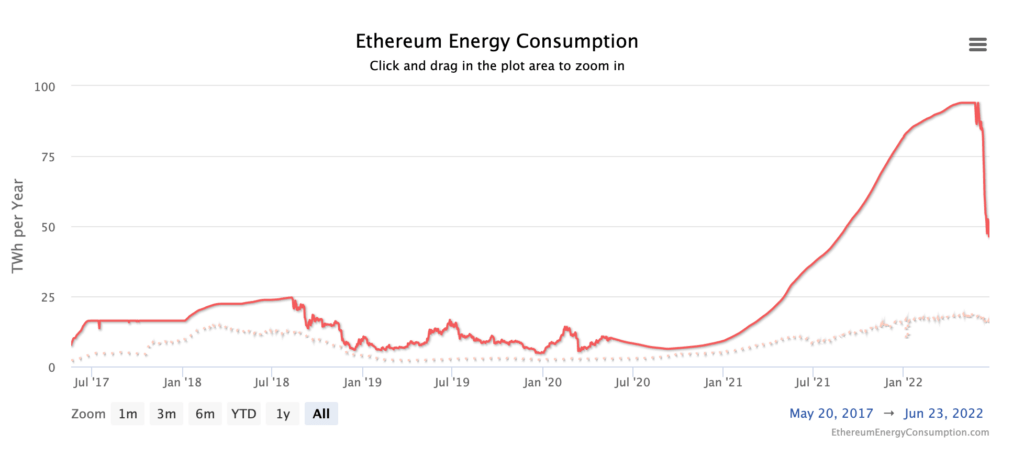Like all other crypto-currencies, bitcoin and Ethereum are also experiencing significant price drops. And this has a direct consequence on the energy consumption of miners.
The amount of energy consumed by the two main blockchains, bitcoin and Ethereum, has dropped sharply. According to the calculations that we consulted on June 24, 2022, and carried out by Diginomiste, a design office which analyzes the ecological impact of crypto-currencies, bitcoin would consume 35% less than expected and Ethereum 49% less, since mid-June 2022.
These figures are surprising: after their creation, the electricity consumption of these blockchains only increased, a fact which is regularly reproached to them and which sometimes causes them problems. Since 2020, their electricity consumption had peaked. Blockchains had never had to deal with a decline in the latter. So what’s going on?

The answer is to be found on the side of the violent drop in prices that the crypto market is currently experiencing. Since the start of the year, bitcoin has lost more than 50% of its value, and Ethereum, which started the year with a value of $3,700, is now worth only $1,200. This drop of value does not only affect crypto investors: it has consequences for the entire ecosystem.
Mining consumes a lot and pays less
To fully understand the situation, we must first go back to the “manufacturing” of crypto-currencies: an act called mining. Crypto-currencies are all backed by blockchains, sorts of decentralized ledgers that allow, among other things, to keep lists of transactions. In order to ensure that the blockchains are not tampered with (by registering, for example, that one has more than it really has), the transactions must be verified by miners.
To ensure that the transactions are valid, they will be put in competition and have to answer extremely complex equations. The first miner to find the answer to the equation wins the right to “mine” the new block, thus verifying the transactions. As a reward, he receives a fixed amount of cryptocurrency.

The system usually guarantees a substantial income for the best equipped miners, and therefore the most able to respond to more calculations. But the drop in crypto prices also means lower wages for miners, who still have to continue to run huge computer farms in the hope of amassing a few bitcoins.
In addition to the drop in crypto prices, there is another element to consider: the price of energy that miners must use to run their farms. However, since the invasion of Ukraine by Russia in February, prices have increased significantly, largely due to economic sanctions against Russia. As the country is the world’s largest gas producer, prices have risen rapidly.
Miners found themselves caught in the crossfire, with lower revenues on the one hand and rising operating costs on the other.By earning less, miners have no interest in keeping an extremely expensive computer fleet running, and Diginomist figures show that a number of miners have preferred to put their activity on hold.
What consequences for bitcoin and Ethereum?
Bitcoin and Ethereum blockchains have therefore been operating with less electricity for some time. Diginomist indicates that since June 11, annual consumption estimates have increased from 204.50 TWh to 132.7 TWh for bitcoin. As for Ethereum, it stalled on May 25, dropping from an estimate of 93.98 TWh to 47.73 TWh.

The fact that there are fewer miners, however, does not mean that blockchains will stop working: there are always a significant number of people left to continue validating the blocks. Transaction security is also not considered.
However, there could be repercussions for crypto ecosystems. First of all, the hashrate, the total computing power on a network used to validate new blocks in a chain, will certainly drop for bitcoin and Ethereum. Since fewer miners are connected to the network, there is actually less power available – a phenomenon that was observed during the mining ban in China. For now, the bitcoin hashrate is not showing any signs of weakness, according to data from Blockchain, but that could soon change.
